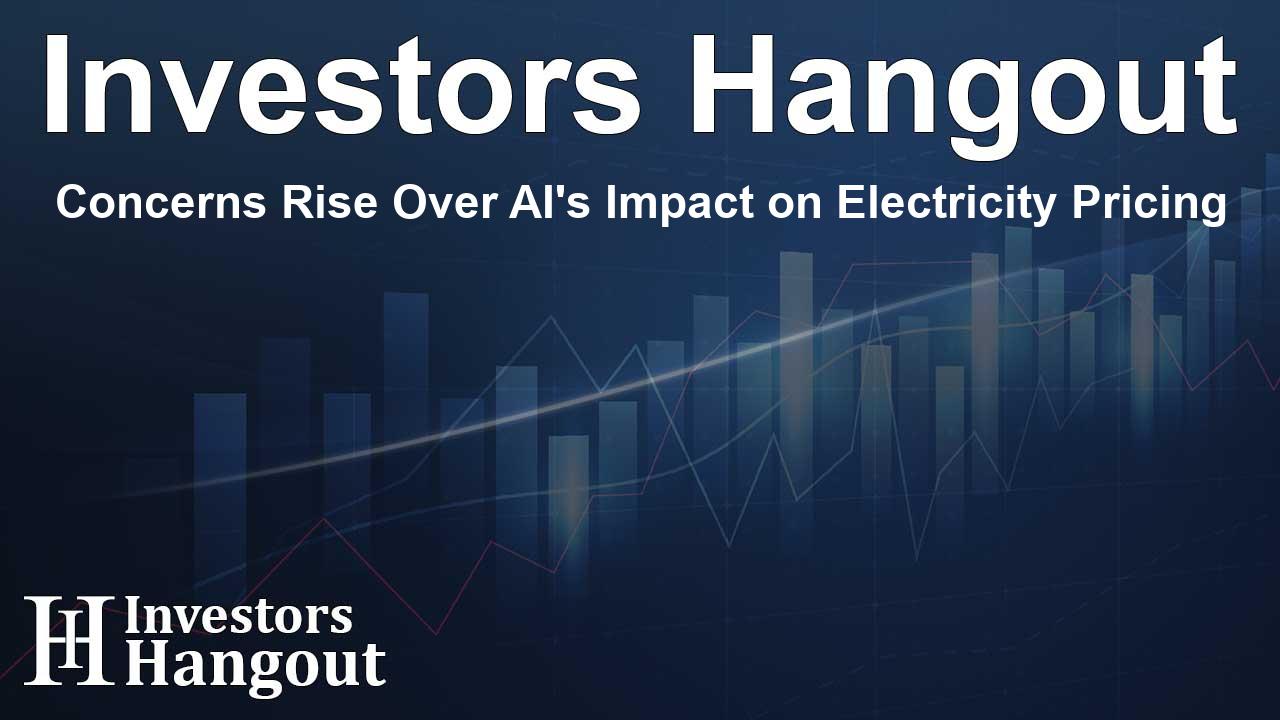Concerns Rise Over AI's Impact on Electricity Pricing

Impacts of AI on Electricity Costs
With the rapid growth of artificial intelligence, led by major tech companies, experts are warning about increased energy consumption. Investors and analysts are particularly concerned as firms like Alphabet Inc. (NASDAQ: GOOGL), Meta Platforms Inc. (NASDAQ: META), Microsoft Corp. (NASDAQ: MSFT), and Amazon.com Inc. (NASDAQ: AMZN) heavily utilize Nvidia Corporation's (NASDAQ: NVDA) powerful GPUs for AI advancements.
Warnings from Industry Experts
Recently, venture capitalist Chamath Palihapitiya raised alarms about the strain AI data centers will place on the power grid. Highlighted by market strategists, Palihapitiya's insights underscore that electricity rates could significantly increase, potentially doubling within five years.
Understanding the Financial Burden
Palihapitiya elaborated on the unprecedented demand for gigawatts of power generated by AI computing operations, which far exceeds existing grid capabilities. This surge in energy needs raises concerns about long-term viability and market dynamics.
Public Relations Dilemma for Tech Giants
The anticipated rise in electricity costs could lead to a public relations crisis for these tech giants. The perception of these companies could worsen if they are blamed for rising energy bills amongst consumers, pushing the narrative that their operations are to blame for increased costs.
Navigating Consumer Concerns
Palihapitiya asserts that these companies must navigate this issue adeptly to mitigate public backlash and negativity surrounding their brands. Addressing customer concerns about energy consumption will be paramount for maintaining public favor and trust.
AI's Environmental and Economic Footprint
As AI continues to evolve, so does the conversation surrounding its environmental impact and economic consequences. There is a growing sentiment that while AI presents transformative opportunities, it could heighten economic anxiety by in tandem increasing operational costs and cutting jobs.
Job Security and Automation Anxiety
Palihapitiya expresses worries about the dual challenges of job displacement through automation and spiraling living costs. As companies push for advancements that may jeopardize job security, maintaining a balance between innovation and responsibility toward their workforce becomes crucial.
Looking toward Sustainable Solutions
To combat these rising pressures, Palihapitiya suggested innovative, albeit futuristic solutions. Strategies like leveraging limitless solar energy and employing AI data centers in space could be a game-changer.
Leveraging Outer Space for Data Centers
By utilizing solar-powered data centers in space, these operations could avoid additional burdens on Earth’s energy resources, while ensuring constant power availability and optimal cooling conditions. This paradigm shift in energy consumption for AI computing could redefine the industry while promoting sustainability.
Investment Opportunities Amidst AI Growth
For investors, there are a number of AI-related exchange-traded funds (ETFs) worth exploring. Investments in such funds might provide a balanced approach amidst the volatile market environment shaped by AI innovations.
Riding the AI Wave
While established funds like iShares US Technology ETF (NYSE: IYW), Fidelity MSCI Information Technology Index ETF (NYSE: FTEC), and First Trust Dow Jones Internet Index Fund (NYSE: FDN) show promising growth, investors must remain flexible and vigilant, keeping market trends in mind.
Market Performance Update
The broader market indicators depict fluctuations, with primary ETFs like SPDR S&P 500 ETF Trust (NYSE: SPY) and Invesco QQQ Trust ETF (NASDAQ: QQQ) reflecting minor declines. The market shifts might prompt investors to adjust their strategies accordingly.
Future Outlook and Projections
As futures suggest upward movement in major indices, including the S&P 500 and Nasdaq 100, market participants will need to stay informed on how AI developments directly influence energy policies and related investments.
Frequently Asked Questions
What warning did Chamath Palihapitiya give regarding AI?
He cautioned that reliance on AI could lead to significantly increased electricity costs, possibly doubling within five years due to the excessive energy demands from AI data centers.
How are big tech firms affected by rising electricity rates?
The potential for increased electricity costs poses a risk to their operations and could harm their public image, particularly if consumers perceive them as responsible for higher bills.
Can AI lead to job losses?
Yes, as automation increases through AI advancements, many jobs, especially in traditional roles, may be at risk of being displaced, leading to economic uncertainties for many workers.
What alternative energy solutions were suggested?
Palihapitiya proposed the concept of space-based data centers that utilize solar energy, which could alleviate strain on Earth’s energy resources and support AI's growth sustainably.
Which ETFs are linked to AI innovations?
Investors can consider ETFs like iShares US Technology ETF (IYW), Fidelity MSCI Information Technology Index ETF (FTEC), and others that focus on technology and innovation related to AI.
About The Author
Contact Evelyn Baker privately here. Or send an email with ATTN: Evelyn Baker as the subject to contact@investorshangout.com.
About Investors Hangout
Investors Hangout is a leading online stock forum for financial discussion and learning, offering a wide range of free tools and resources. It draws in traders of all levels, who exchange market knowledge, investigate trading tactics, and keep an eye on industry developments in real time. Featuring financial articles, stock message boards, quotes, charts, company profiles, and live news updates. Through cooperative learning and a wealth of informational resources, it helps users from novices creating their first portfolios to experts honing their techniques. Join Investors Hangout today: https://investorshangout.com/
The content of this article is based on factual, publicly available information and does not represent legal, financial, or investment advice. Investors Hangout does not offer financial advice, and the author is not a licensed financial advisor. Consult a qualified advisor before making any financial or investment decisions based on this article. This article should not be considered advice to purchase, sell, or hold any securities or other investments. If any of the material provided here is inaccurate, please contact us for corrections.
